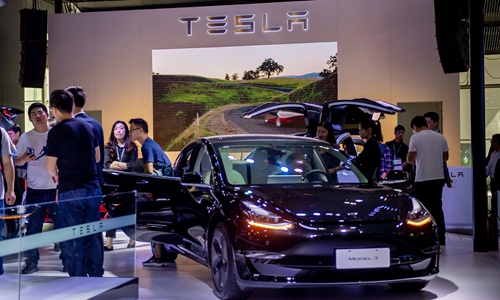
A Tesla Model 3 displayed at the Guangzhou Autoshow on November 22 Photo: VCG
Electric vehicle (EV) giant Tesla anticipates it will achieve 80 percent auto component localization at its Shanghai factory this year. The news comes after China's successful production resumption and market recovery, while countries like the US continue to tackle their own COVID-19 crises.An industry insider said that China's role as a driving force in the global auto industry is being further highlighted in the post-pandemic period as a result of its market resumption, and that it will only be a matter of time before international auto companies like Tesla produce higher percentages of their auto parts in China.
Tesla reported a GAAP operating income of $327 million in the second quarter, with an operating profit margin of 5.4 percent, according to Tesla's latest fiscal report that the company sent to the Global Times on Thursday.
Tesla's business performance has shown strong resilience in these unprecedented times.
In the second quarter, Tesla delivered 31,000 vehicles in China, accounting for 30 percent of its global sales, according to the China Passenger Car Association.
Despite a decrease in Tesla's average vehicle sale price as well as the shutdown of its major factory in Fremont, California for nearly half a quarter, Tesla has been able to achieve a positive outcome in its overall profitability, said the report. That was down to improvements in production and manufacturing costs, as well as increased revenues from after-sales software and mobile connectivity.
Tesla reported a net GAAP profit of $104 million in the second quarter, its fourth consecutive quarterly profit, while generating positive free cash flow of $418 million, according to Tesla.
Over the past year, Tesla has been increasing the proportion of local components in its cars. It has also made further efforts to localize its products, including strengthening its voice control function in December 2019. The function can now recognize dialects from most parts of China, making interaction more convenient.
In January, the company also introduced Baidu Maps in its vehicle-mounted navigation system. Baidu Maps is widely used by Chinese people.
"The 80 percent localization may include important components such as car bodies, transmission devices, batteries and electrical machinery," Xu Haidong, assistant secretary-general of the China Association of Automobile Manufacturers, told the Global Times on Thursday, noting that Tesla's efforts to localize are mainly to reduce costs and get closer to the local market.
The company now buys 40 percent of its components locally, and that could reach 80 percent by the end of the year. Locally sourced parts could make a big difference to the cost of vehicles produced in Shanghai, company CEO Elon Musk said during a conference call after the release of Tesla's second-quarter earnings, media reported.
Song Gang, Tesla's manufacturing director in Shanghai, said last December that the company hoped to achieve a 100 percent localized parts supply by the end of the year, according to Chinese news portal Sina Finance.
It may take Tesla's new Shanghai plant longer than the company originally envisioned to fully localize its parts supply, with prices for domestic models likely to remain high for some time, media reported.
Xu believes that despite the growing localization trend, some chips, software and autopilot systems will continue to be produced abroad for some time.
"This is not a question of technical barriers, but more a question of cost performance," Xu said.

